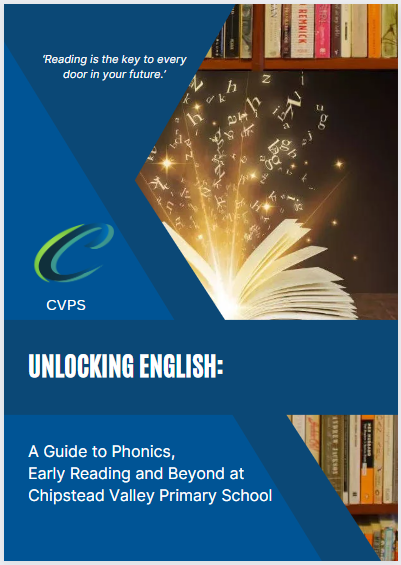English
The overarching aim for English in the national curriculum is to promote high standards of language and literacy by equipping pupils with a strong command of the spoken and written language, and to develop their love of literature through widespread reading for enjoyment.
Speaking and Listening
At Chipstead Valley Primary our aim is for children to learn to communicate their thoughts, ideas and opinions clearly and succinctly, as well as to listen to and reflect on the ideas of others. We encourage children to turn-take in conversations and adapt their speech to a range of situations and audiences. From an early age, the children are encouraged to participate in a range of activities such as drama and role-play.
Phonics, Early Reading and Beyond
Please click on the link below the picture for a guide to Phonics, Early Reading and Beyond at Chipstead Valley Primary School:
 Unlocking English Phonics, Early Reading and Beyond!
Unlocking English Phonics, Early Reading and Beyond!
Further information
For further information including useful videos and tips on how to support your child with reading at home, please visit the FFT parent portal:
You will also find more information in the guide attached - FFT Parent and Carer guide.
Reading for pleasure
 At Chipstead Valley we want children to develop enjoyment of reading. We encourage children to read for pleasure and to develop the ability to read fluently and with understanding. We have an inviting library area that all classes have access to throughout the week, which is generously stocked with age appropriate and popular texts. Book corners or class libraries are based in each classroom, celebrating reading for enjoyment and we also have a beautiful reading garden.
At Chipstead Valley we want children to develop enjoyment of reading. We encourage children to read for pleasure and to develop the ability to read fluently and with understanding. We have an inviting library area that all classes have access to throughout the week, which is generously stocked with age appropriate and popular texts. Book corners or class libraries are based in each classroom, celebrating reading for enjoyment and we also have a beautiful reading garden.
Writing
Writing is developed from an early age by mark making and activities to develop fine motor skills.
We aim for our children to develop their ability to write in a wide range of genres, both fiction, non-fiction and poetry.
In KS1 children are taught to use finger spaces, full stops and capital letters and progress to using other forms of punctuation such as question and exclamation marks. They are taught about using engaging and meaningful vocabulary to make their writing interesting. By the end of KS1, pupils begin to evaluate and make some improvements to their writing.
In KS2, pupils develop competence in the accuracy of grammar, punctuation and spelling and the structure of text composition. Children are taught the skills of planning and drafting an extended piece of writing, organising their work coherently and the processes of evaluation and editing. Pupils will apply their skills through a range of genres considering vocabulary and structures appropriate for the purpose and audience.

